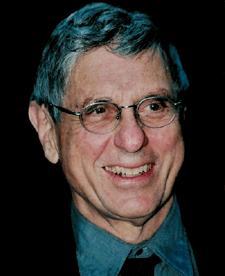
Daniel Kivelson - a distinguished UCLA chemistry professor and charismatic teacher, who joined the faculty in 1955, and chaired the department from 1975-78 died of cancer Wednesday night at UCLA's David Geffen School of Medicine. He was 73.
"Daniel was in many ways the ideal of a UCLA professor," said Charles Knobler, professor and former chair of UCLA's Department of Chemistry and Biochemistry. "He was an original and deep scholar, a great teacher, and a campus leader. Above all else, he was an extraordinary friend and counselor to so many of us."
"Daniel's ambition has been a source of inspiration - an ambition not to win prizes and attract attention, but to do beautiful science, enjoy doing it with friends, and instruct new generations of scientists," said William Gelbart, professor and current chair of UCLA's Department of Chemistry and Biochemistry. "Daniel was the person to whom most of us had been going for more than four decades when we needed to talk. Perhaps it was a time when we were feeling exuberant about an upward turn in our research; we could always count on Daniel to share our excitement. Perhaps it was a time when we needed some encouragement or technical help; we knew he would spend whatever time and attention might be necessary to get us on our feet."
Kivelson's approach to science was characterized by expertise in experimentation combined with fundamental theoretical analysis. Throughout his 50-year research career, he brought significant insights into the way molecules move in liquids. The movements of molecules in liquids consist of "translations", in which the molecules move from place to place, and tumbling motions. There is a constant exchange of energy between these types of motion, Knobler explained.
"Daniel showed how these exchange processes, which chemists and physicists call 'relaxation,' could be determined from an analysis of the ways in which the molecules absorb and emit electromagnetic radiation - light and radio waves - and from the ways in which they scatter light from lasers," Knobler said. "His analyses of these complex problems were verified by many experiments and his statistical mechanical theories have been employed by physicists and chemists throughout the world."
In his most recent research, which he was actively pursuing when he died, Kivelson was trying to understand what determines the properties of glasses. Most fluids freeze into crystals when their temperature is lowered, but some "supercooled" liquids do not crystallize; these include not just familiar materials such as window glass and plastics, but under certain circumstances, liquids such as water. There is a "glass transition" where the molecular motions slow significantly. The nature of this transition has long been under investigation and its origin has been extensively debated, Knobler said. Kivelson began this work in a collaboration with his son Steven and then with his colleague Gilles Tarjus developed a novel theory that explained this transition and showed how it could account for the formation of glasses, and predict the circumstances under which glasses will form.
"I have never been as excited by my science as with this work," Kivelson said in 1997, "because it represents an attempt to develop a novel, initial description of important, but still not well-understood phenomena." He continued to pursue this research with energy and enthusiasm until shortly before his death.
Knobler described the Kivelson family as a "distinguished academic dynasty." Daniel's wife, Margaret G. Kivelson, is professor of geophysics and planetary physics at UCLA and a member of the National Academy of Sciences. Their son, Steven Kivelson, is professor of physics at UCLA, specializing in condensed matter theory. Their daughter, Valerie Kivelson, an associate professor of history at the University of Michigan, is an expert on Russian history. All four of the Kivelsons were undergraduates at Harvard; Daniel, Margaret and Steven also earned their Ph.D.'s there.
Kivelson earned many accolades for both his research and teaching, including Guggenheim, Sloan and Fulbright Fellowships; the American Chemical Society's California Section Award; the American Physical Society's Langmuir Prize in Chemical Physics; the Herbert Newby McCoy Award; and UCLA's Harvey L. Eby Art of Distinguished Teaching Memorial Award.
Kivelson chaired the UCLA Academic senate from 1979-80. " He served brilliantly on countless committees and executive boards whose actions and recommendations shaped the course of growth and change at UCLA," Gelbart said. A colleague, Professor Emily Carter, added "Daniel made a lasting mark on everyone who interacted with him closely. All of us recall his penetrating intellect, his dazzling originality, his relentless honesty, his loving generosity in thought and action, his infectious love for and appreciation of the richness of life's offerings, his megawatt smile."
Daniel and Margaret G. Kivelson have been avid collectors of Turkoman rugs, which he called a family obsession, and lent pieces from their collection to shows at the Textile Museum in Washington, D.C. and most recently the Los Angeles County Museum of Art. Daniel, Steve, and Margaret jointly co-authored "Introduction to Turkoman Weaving," an introduction to a catalog of a rug exhibit published in 1975.
Kivelson is survived by Margaret, their daughter Valerie and her husband Tim, son Steven and his wife Pam, five dearly beloved grandchildren, his sister Nina Auerbach of San Francisco and brother Arnold Kivelson of New York City.
UCLA will hold a memorial service in the Faculty Center's California Room on Jan. 31st, from 4-7 p.m. For more information, call the department of chemistry and biochemistry at (310) 825-3958.
The Kivelson family requests that donations be made to a fund that will be used to provide undergraduate research fellowships in chemistry. Checks may be made to the UCLA Foundation, with the notation "Kivelson Fund," and sent to UCLA, Department of Chemistry and Biochemistry, 3010 Young Hall, Los Angeles, CA 90095-1569.-UCLA-